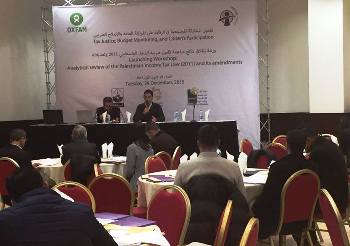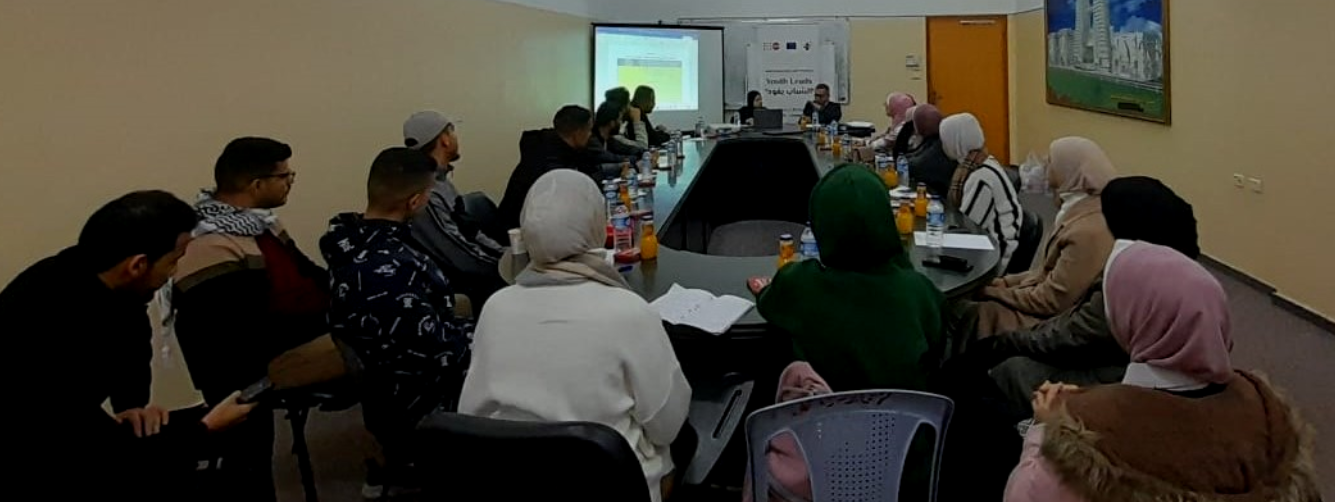
As part of the project: “Tax justice, budget monitoring and citizen participation in the oPt” implemented by MIFTAH in participation with AMAN, TCC and ARIJ Institute with funding from OXFAM, a workshop was recently held in which the results of the 2011 Palestinian income tax review and its amendments, were launched. Focus was put on the current condition of taxes regarding income tax from the perspective of social and economic justice and also on linking the study’s results to international criteria of integrity and transparency to gauge the extent of justice in tax collection.
The results of the review concluded with a number of recommendations including:Providing remedies to the constitutional and procedural encroachments brought by the entire process that produced the Income Tax Law, also avoiding making further amendments without approval from the PLC.; It is important to consider the socioeconomic conditions of the taxpayers, particularly when considering allowable deductions for dependency, university education and healthcare, allowing also for preferential treatment for productive activities and vulnerable areas, and areas threatened by the separation wall and settlements ; increasing the number of tax brackets to 5 (instead of 3) to ensure better Socioeconomic justice in society, and imposing higher rates on the fourth and fifth brackets; expanding the tax base and extend the coverage to additional incomes (or those with weak coverage) such as the self-employed professions, capital transactions and trade in real estate.; Granting full income tax exemptions to agricultural income and pensions; Enhancing coordination between tax departments and representatives of taxpayers through a computerized tax system; and exchanging information and coordination with other government departments. Supporting the tax department with the financial resources and logistics needed to build the capacity of the staff, as well as offering training courses for the tax department staff; expanding community engagement through discussions with concerned groups; reconsidering the tax burden to include/further spot non-traditional, non-value added activities that achieve big profits and to increase the exemptions for lower-income earners, individuals/businesses engaged in productive activities, and vulnerable rural areas.
Two position papers
Two position papers were presented at the workshop. The first was entitled: “Taxes, fees and achieving social justice” which concluded with several points such as the following: the tax, fees and collection system as a system enforced within the framework of the PA lacks a system of social justice. It also has vague and unclear points and lacks cognitive awareness vis-à-vis the occupation’s practices and impacts.
Social justice is achieved through unifying the legal bond of the financial system as a whole, and strengthening mechanisms for accountability, monitoring, transparency and the enforcement of the law on all sectors without discrimination. It is also through reaffirming the urgent need to raise awareness among citizens and through the active participation of communities; through clarifying financial and tax policies and their tangible reflection in social, services and economic issues; and through clearer policies to support marginalized areas targeted by the occupation.
The position paper also reaffirmed that development sectors such as education, health and basic services like water, electricity, sanitation and street lighting, are determinants for development, safety rights and basic dignified living for each and every citizen. This is in addition to promoting the role of civil society institutions and media organizations and reviving the role of information technology and social mediums as a way to bridge the gap between the parties.
The second position paper was entitled: “Social participation in monitoring budgets and the mechanisms of public spending.” The paper concluded with a group of results including: promoting the role of institutions in social participation; preparing special programs for strategic planning and expanding their scope to include mechanisms for monitoring public spending; the need to update legal and financial centers that could help civil society to better understand financial issues in addition to formulating clear mechanisms for monitoring collection and spending; more legal accountability and specialized monitoring; enacting the monitoring and legislative role; promoting mechanisms of independent monitoring through renewing special commissions in this regard and in partnership with the various relevant parties; forming support committees for local bodies comprised of all sectors of the community; opening up municipalities to the public so they could be a platform for pressuring the government to fulfill its commitments; promoting participation in the preparation of the budget and monitoring the mechanisms of public spending on development projects.
MIFTAH project coordinator Shadi Zeidat pointed out that this type of research and studies is part of a framework for reviving civil society and influencing public opinion towards addressing issues pertaining to financial policies and the tax system. He continued that it is also aimed at pressuring the government and legislators to consider the justice perspective as a basis in formulating financial policies and legislation in a way that would protect Palestinian citizens’ rights and guarantee public interest in public spending policies.








